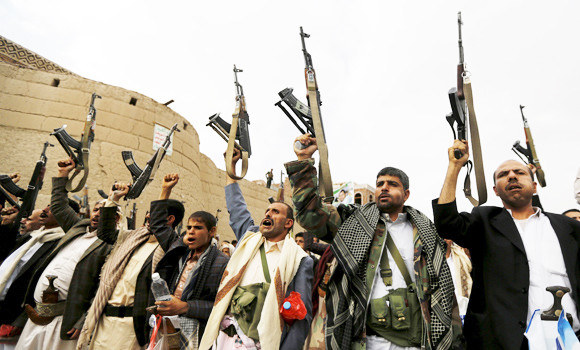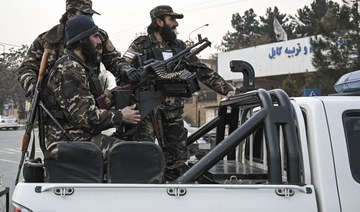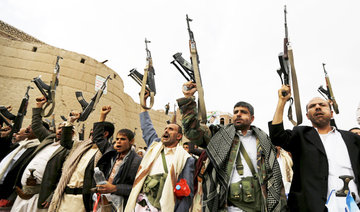DUBAI: Amnesty International has urged Yemen’s Houthi militia to free four journalists facing the death penalty for “espionage” in the war-torn country, ahead of an appeal court hearing on Sunday.
The four, Abdul Khaleq Amran, Tawfiq Al-Mansouri, Harith Hamid and Akram Al-Walidi were arrested in June 2015 in Yemen’s Houthi-held capital Sanaa.
“Yemen’s Houthi de facto authorities must quash the death sentences and order the immediate release of four Yemeni journalists who are facing execution following a grossly unfair trial,” the rights group said in a statement on Friday.
In April 2020, a Houthi court sentenced the four journalists to death on charges of “treason and spying for foreign states.”
“This has been a sham of a trial since the beginning and has borne a terrible toll on the men and their families,” said Amnesty’s Middle East and North Africa deputy director Lynn Maalouf, according to the statement.
One of the detained men, Mansouri, is in a “critical health condition” with heart and other ailments, Amnesty said.
“Pending their overdue release, the journalists must be provided with urgent medical care — the denial of medical treatment for the seriously ill is an act of cruelty which amounts to torture and other ill-treatment,” the statement said.
At the time of their trial, Amnesty criticized their sentencing on “trumped-up charges,” while Reporters Without Borders called the verdict “totally unacceptable.”
Their arrest was motivated by their reporting on “human rights violations committed by Houthis,” the International Federation of Journalists and the Yemeni Journalists’ Syndicate have said.
An appeal will be heard by the Specialized Criminal Appeals Division in Sanaa on Sunday.
Amnesty urges Yemen’s Houthi militia to free journalists on death row
https://arab.news/6j2vc
Amnesty urges Yemen’s Houthi militia to free journalists on death row

- The four, Abdul Khaleq Amran, Tawfiq al-Mansouri, Harith Hamid and Akram al-Walidi were arrested in June 2015 in Sanaa
- In April 2020, a Houthi court sentenced the four journalists to death on charges of "treason and spying for foreign states"
Ultra-Orthodox protesters block Jerusalem roads ahead of Israeli court decision on draft exemptions

- Most Jewish men and women in Israel are required to serve mandatory military service at the age of 18.
- But the politically powerful ultra-Orthodox have traditionally received exemptions if they are studying full-time in religious seminaries
Dozens of ultra-Orthodox protesters blocked roads in Jerusalem on Sunday as Israel’s Supreme Court heard arguments in a landmark case challenging a controversial system of exemptions from military service granted to the religious community.
The court is looking at the legality of the exemptions, which have divided the country and threatened to collapse Prime Minister Benjamin Netanyahu’s governing coalition. A decision is expected in the coming weeks.
Most Jewish men and women in Israel are required to serve mandatory military service at the age of 18. But the politically powerful ultra-Orthodox have traditionally received exemptions if they are studying full-time in religious seminaries. These exemptions have infuriated the wider general public, especially as hundreds of soldiers have been killed in the war with Hamas.
During Sunday’s arguments, government lawyers told the judges that forcing ultra-Orthodox men to enlist would “tear Israeli society apart.” The court suggested a target of enlisting 3,000 ultra-Orthodox men a year –- more than double the current levels but still less than 25 percent of their overall numbers.
In Jerusalem, Israeli police cleared protesters from roads, and forcefully removed those who briefly blocked the city’s light rail. Demonstrators chanted “to prison and not to the army.”
In March, the court ordered an end to government subsidies for many ultra-Orthodox men who do not serve in the army.
Netanyahu faces a court-ordered deadline of June 30 to pass a new law that would end the broad exemptions. But he depends on ultra-Orthodox parties to prop up his government, and ending the exemptions could cause them to leave and trigger new elections.
12 pro-regime fighters killed in Israeli strike near Syria’s Aleppo: NGO

- The Israeli attack targetted a factory in the town of Hayyan, north of Aleppo, the Syrian Observatory for Human Rights said
- The casualties were pro-Iranian fighters of Syrian and foreign nationalities, added the UK-based war monitor
BEIRUT: At least 12 pro-regime fighters were killed in an overnight Israeli strike that targeted a factory near Aleppo in the north of Syria, an NGO reported early Monday.
“Twelve pro-Iranian fighters of Syrian and foreign nationalities were killed, according to an initial tally, in an Israeli air strike on a position in the town of Hayyan, north of Aleppo, setting off strong explosions in a factory,” the Syrian Observatory for Human Rights said.
The Syrian Ministry of Defense said in a statement that “after midnight... the Israeli enemy launched an air attack from the southeast of Aleppo, targeting some positions” near the city, adding that “the aggression caused several martyrs and material damage.”
According to the Observatory — which is based in Britain, but maintains a vast network of sources inside Syria — rescuers and firefighters were deployed to the site to treat the injured and contain blazes caused by the strike.
The NGO said that Hayyan is “controlled by pro-Iranian groups composed of Syrians and foreigners.”
Israel has carried out hundreds of strikes on its northern neighbor since the outbreak of Syria’s civil war, mainly targeting army positions and Iran-backed fighters, including from the militant group Hezbollah.
While it rarely comments on individual strikes in Syria, Israel has repeatedly said it will not allow its arch-enemy Iran to expand its presence there.
The strikes have increased since its war with Hamas in the Gaza Strip began on October 7, when the Iran-backed Palestinian militant group launched an unprecedented attack against Israel.
Syria’s war has killed more than half a million people and displaced millions more since it erupted in 2011 after Damascus cracked down on anti-government protests.
Israel seeks a ‘governing alternative’ to Hamas in Gaza. It’s been tried and failed before

- Defense Minister Yoav Gallant said Israel "will not accept the rule of Hamas at any stage in any process aimed at ending the war"
- An Israeli analyst of Palestinian affairs he has "not heard of any local players that are brave enough to present themselves as an alternative to Hamas"
JERUSALEM: Israel is looking into an alternative local governing body for Gaza, the defense minister said Sunday, proposing a future beyond Hamas but giving no idea who those challengers might be.
Defense Minister Yoav Gallant’s comments came at a time of new uncertainty in the eight-month war. Israeli Prime Minister Benjamin Netanyahu is under growing pressure from many Israelis to accept a new ceasefire deal proposed by US President Joe Biden, while far-right allies threaten to collapse his government if he does.
Gallant, part of Israel’s three-member War Cabinet who recently urged the government to have a detailed postwar plan for Gaza, said in a briefing that “we seek a governing alternative to Hamas. The framework for this includes isolating areas, removing Hamas operatives in these areas and bringing in other forces that will enable the formation of a governing alternative.”
That will achieve Israel’s goals of removing Hamas’ military and governing authority in Gaza and returning home the remaining hostages taken in the Oct. 7 Hamas attack that sparked the war, Gallant said. He stressed that “we will not accept the rule of Hamas at any stage in any process aimed at ending the war.”
In response to questions, an Israeli defense official told The Associated Press that Gallant hopes to enable isolated, Hamas-free areas in Gaza to become “hubs of local government” and identify forces that can enable a longer-term formation of a government.
Israel is looking for “local non-hostile actors,” the official said, adding that Gallant believes that “Palestinians should be governing Palestinians.” Israel would facilitate surges of aid to the areas, and the local forces would be responsible for distributing it to strengthen their authority.
But that approach is challenging and has failed before, one expert said.
“I haven’t heard of any local players that are brave enough to present themselves as an alternative to Hamas,” said Michael Milshtein, an Israeli analyst of Palestinian affairs at Tel Aviv University and a former military intelligence officer.
Milshtein said Gallant’s “wishful thinking” would amount to a suicidal mission for any local leader. Hamas has threatened anyone cooperating with Israel’s government.
“Although Hamas suffered severe damage over the past eight months, their impact on the public is still very strong,” he said.
Milshtein noted that Israel has tried this approach in the past. In the 1970s and ‘80s, Israel tried to establish “village leagues,” empowering local Palestinian leaders.
“They were considered in the eyes of Palestinians as collaborators, and it ended in a very tragic manner,” he said. Unless Israel maintains a constant presence in Gaza, any “alternative forces” they try to install will be too fragile, he added.
Netanyahu has said Israel will maintain security control over Gaza but delegate civilian administration to local Palestinians unaffiliated with Hamas or the Western-backed Palestinian Authority, which governs parts of the occupied West Bank. He has ruled out a path to Palestinian statehood.
Top ally the US has proposed that a reformed Palestinian Authority would govern Gaza with the assistance of Arab and Muslim nations.
The Hamas attack on Oct. 7 in southern Israel killed around 1,200 people — mostly civilians — and abducted about 250. About 100 hostages remain in Gaza, along with the bodies of around 30 more.
Over 36,430 Palestinians have been killed in Gaza by Israel’s offensive, according to Gaza’s Health Ministry. Its count doesn’t differentiate between civilians and combatants. Israel blames Hamas for civilian deaths, accusing it of operating from dense residential areas.
At least five people including a young girl were killed Sunday in a strike on a street in Zawayda, central Gaza, according to Palestinian health officials and AP journalists at Al-Aqsa Martyrs hospital who counted the bodies.
The United States continued to press Israel on the ceasefire proposal outlined by Biden, who said Friday it’s time for the war to end. Many of Gaza’s 2.3 million people have been displaced and shelter with few supplies, large parts of the territory have been destroyed and the United Nations has warned of “full-blown” famine.
The deal’s first phase would last six weeks and include a “full and complete ceasefire,” a withdrawal of Israeli forces from all densely populated areas of Gaza and the release of a number of hostages, including women, older people and the wounded, in exchange for the release of hundreds of Palestinian prisoners. Biden acknowledged that moving into the next phase of the deal would require more negotiations.
“This was an Israeli proposal. We have every expectation that if Hamas agrees to the proposal – as was transmitted to them, an Israeli proposal – then Israel would say yes,” White House National Security Communications Adviser John Kirby told ABC.
Also Sunday, officials from Egypt, Israel and the US ended a meeting in Cairo without any apparent agreement to reopen the crucial Rafah crossing into Gaza, which has been closed since Israel took over the Palestinian side of it in early May, Egypt’s state-run television channel Al-Qahera News reported.
Israel’s military continues to press into Rafah, Gaza’s southernmost city, in search of what’s been described as Hamas’ last stronghold even as the militants regroup elsewhere in the territory.
Citing an unnamed official, Al-Qahera News said Egypt affirmed that Israel must withdraw its forces from the Palestinian side of the crossing before it can reopen. The report said Egypt accused Israel of blocking the delivery of badly needed humanitarian aid to Gaza, which Israel denies.
Gaza mothers search for milk as malnutrition hits hard

GAZA STRIP: Amira Al-Taweel scoured pharmacies in northern Gaza for milk to feed her child, but could not find a single bottle to satisfy his hunger.
“Youssef needs treatment and milk, but there’s none available in Gaza,” the 33-year-old mother said at Al-Aqsa Martyrs hospital in central Gaza where her son was admitted suffering from malnutrition.
“I feed him, but no milk as it’s not available. I feed him wheat (flour) which makes him bloated,” she said, as Youssef lay on a narrow bed, his frail body receiving desperately needed medication through intravenous tubes in his feet.
The Hamas government media office said that at least 32 people, many of them children, have died of malnutrition in Gaza since the war broke out on Oct. 7.
Israel’s military campaign has killed 36,439 people in Gaza, also mostly civilians, according to the territory’s Health Ministry.
But aid agencies warn that the situation is even worse when it comes to children.
On Saturday, the World Health Organization said that more than four in five children had gone a whole day without eating at least once in 72 hours.
“Children are starving,” WHO spokeswoman Margaret Harris said in a statement.
The rise in malnutrition among Gaza’s children is largely a result of humanitarian aid that enters the Palestinian territory not reaching its intended destination, aid agencies said.
Since mid-January the UN humanitarian agency OCHA has screened more than 93,400 children under five in Gaza for malnutrition, including 7,280 who were found to be acutely malnourished.
Malnutrition is particularly prevalent in northern Gaza, which received little aid in the early months of the war.
Only in recent weeks has much of the food aid been diverted through new crossings after aid agencies warned of imminent famine.
The Israeli military said on Sunday that a total of 1,858 trucks of aid were inspected and sent into Gaza this week through its Kerem Shalom and Erez West crossings, including 764 from Egypt.
At Al-Aqsa Martyrs hospital, mothers were concerned about their malnourished children.
After Youssef and another baby boy, Saif, were admitted, their mothers sat next to them, worrying about how long they could survive on the food the hospital provides.
“We depend on the aid that comes here and is given to the children,” said Noha Al-Khaldi, mother of Saif, whose skin was stretched over protruding bones.
“All night long he suffers ... He was supposed to have an operation, but it was postponed.”
UAE’s foreign minister visits National Institute of Education in Singapore

- Minister affirms support in strengthening cooperation in the education sector
LONDON: The UAE’s Foreign Minister Sheikh Abdullah bin Zayed Al-Nahyan visited the National Institute of Education in Singapore on Sunday, the Emirates News Agency reported.
Founded in 1950, the NIE has been instrumental in developing Singapore’s teaching workforce.
Upon his arrival at the institute, Sheikh Abdullah was welcomed by Christine Goh, the NIE’s director professor.
The minister toured the institute’s facilities and was briefed on the NIE’s influential role in shaping and advancing Singapore’s educational system and contemporary teaching methodologies.
He praised the NIE as one of the world’s premier academic institutions in educational excellence and leadership. He highlighted that the NIE reflects Singapore’s robust educational system, a cornerstone of the nation’s overall development.
The foreign minister also emphasized the UAE’s commitment to strengthening educational cooperation with Singapore, noting that education is fundamental to sustainable development, progress, and the safeguarding of national achievements.
Sheikh Abdullah affirmed the UAE’s support in strengthening cooperation with Singapore in the education sector within the framework of the comprehensive partnership between the two countries.






















